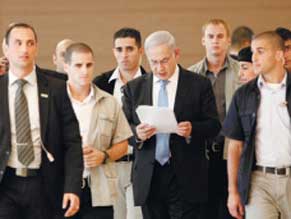|
World Jewish News

Prime Minister Benjamin Netanyahu, flanked by security guards and advisers, arriving at a meeting of his Likud faction in the Knesset, October 31, 2011. Photo by: Tomer Appelbaum
|
Israel warns West: Window of opportunity to thwart Iran nuclear program is closing
01.11.2011, Israel and the World Israeli ambassadors in Western countries have been instructed to inform high-ranking politicians that the window of opportunity for imposing effective sanctions on Iran is closing, as part of a renewed diplomatic offensive aimed at using new sanctions to stop Tehran from developing a nuclear bomb.
The Foreign Ministry campaign, which began in mid-September, seeks to convince the United States, European Union member states and other Western countries to impose the sanctions immediately because Iran is continuing to develop its nuclear program.
"The significant progress that has taken place on all the components of the Iranian nuclear program should be emphasized, especially uranium enrichment," said a classified cable sent to Israeli ambassadors in several dozen countries. "The Iranian program is military, and in light of International Atomic Energy Agency reports, there is an increased fear that the Iranians are developing a nuclear warhead for ballistic missiles."
The ambassadors were asked to tell the equivalent of the foreign ministries and prime minister's offices in the countries where they are serving that there isn't much time left to stop the nuclear program through diplomatic means.
The sanctions campaign comes ahead of the planned November 8 release of an IAEA report, which is expected to reveal new details about the scope of Iran's nuclear program. The IAEA is reportedly preparing to bring proof that Iran is attempting to build a nuclear bomb.
Israel and the U.S. are planning to use the report in a worldwide campaign to push for isolating Iran. Sanctions suggested by Israeli representatives in recent talks with the U.S., France, Britain and Germany include banning contact with Iran's central bank and banning the purchase of Iranian crude oil. Israeli officials also suggested imposing additional sanctions on Iranian airlines and ships.
Israeli officials noticed last month that international interest in stopping Iran was flagging, said a senior Foreign Ministry official. "International and Israeli attention was focused on the Arab Spring, on flotillas to Gaza and on the Palestinian move in the UN," he said.
Foreign Ministry officials were concerned that the reduced attention Iran was receiving made its pursuit of a nuclear program seem less urgent.
"There's a feeling that even though the sanctions are harming Iran, the technological timetable is faster than the diplomatic timetable," said another Foreign Ministry official. "Now is the time to intensify the steps against Iran. The pressure influences Iran, and the present circumstances require us to increase that pressure. The Iranians are preparing a technological infrastructure that will enable them to have a breakthrough as they head for nuclear weapons within a short time span. If Iran passes this technological threshold, the ramifications will be severe - especially in light of the weakening of regional stability following the Arab Spring."
A few days ago, the ambassadors received another cable, directing them to highlight the alleged Iranian plot to assassinate the Saudi ambassador to Washington. "You should emphasize that this incident indicates the need to isolate Iran," the cable said.
The Israeli ambassadors were also informed that Iran is boosting arms smuggling to Syria, Hamas, Islamic Jihad and Hezbollah.
According to Israeli intelligence information, Iran has been carrying out low-level uranium enrichment at a stable pace, despite the existing sanctions. Iranian officials have been outspoken about their interest in tripling the pace of producing uranium enriched to 20 percent, moving the centrifuges from a non-reinforced facility in the central Iranian city of Natanz to an underground enrichment facility in Qom. At the same time, Iran is continuing to build a heavy water reactor in Arak, which would enable them to produce the plutonium needed for a nuclear bomb.
One of the Foreign Ministry officials said Israel wants Western countries to impose the sanctions on their own because domestic politics and leadership changeovers in Russia and China in 2012, along with the U.S. and French presidential elections, will make it impossible to secure another UN Security Council resolution approving sanctions.
Although Israel's latest push for sanctions is new, diplomatic efforts to thwart the Iranian nuclear program are ongoing, one of the Foreign Ministry officials said. An interministerial task force headed by Yaakov Amidror, the national security adviser, meets every few weeks to coordinate the diplomatic efforts. Other members of the task force include representatives of the foreign and defense ministries, the IDF and the Mossad.
By Barak Ravid
Haaretz.com
|
|
